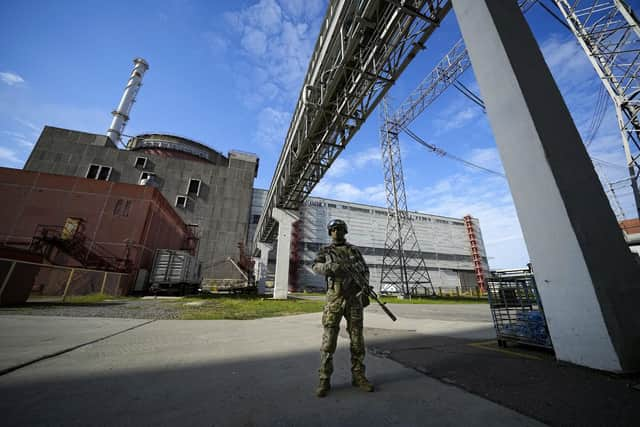Ukraine invasion: Russia 'nearly caused radiation disaster' at Zaporizhzhia nuclear power plant
A blackout across the region on Thursday heightened fears of a catastrophe in a country still haunted by the Chernobyl disaster.
The complex, Europe's largest nuclear plant, has been occupied by Russian forces and run by Ukrainian workers since the early days of the six-month-old war.
Advertisement
Hide AdAdvertisement
Hide AdUkraine alleges Russia is essentially holding the plant hostage, storing weapons there and launching attacks from around it, while Moscow accuses Ukraine of recklessly firing on the facility.


On Thursday, the plant was cut off from the electrical grid after fires damaged the last operating regular transmission line, according to Ukraine's nuclear power agency, Energoatom.
Mr Zelensky blamed Russian shelling and said the plant's emergency backup diesel generators had to be activated to supply power needed to run the plant.
"Russia has put Ukraine and all Europeans one step away from a radiation disaster," the president said in his nightly video address.
Zaporizhzhia's Russian-installed regional governor, Yevgeny Balitsky, blamed the transmission-line damage on a Ukrainian attack.
It was not immediately clear whether the damaged line carried outgoing electricity or incoming power, needed for the reactors' vital cooling systems. A backup line supplying electricity from another plant remained in place, Energoatom said.
But Mr Zelensky's mention of the emergency generators being activated raised questions of whether the cooling systems were endangered. A loss of cooling could cause a nuclear meltdown.
As a result of the transmission-line damage, the two reactors still in use out of the plant's six went offline, Mr Balitsky said, but one was quickly restored, as was electricity to the region.
Advertisement
Hide AdAdvertisement
Hide AdThe UN's International Atomic Agency said Ukraine informed it that the reactors' emergency protection systems were triggered, and all safety systems remained operational.
The three regular transmission lines at the plant are out of service because of previous war damage.
"Anybody who understands nuclear safety issues has been trembling for the last six months," Mycle Schneider, a consultant and coordinator of the World Nuclear Industry Status Report, said before the latest incident.
Ukraine cannot simply shut down its nuclear plants during the war because it is heavily reliant on them. Its 15 reactors at four stations provide about half of its electricity.
That fear is palpable just across the Dnieper River in Nikopol, where residents have been under nearly constant Russian shelling since July 12, with eight people killed, 850 buildings damaged and over half the population of 100,000 fleeing the city.
Mr Zelensky has accused Russia of "nuclear blackmail" at Zaporizhzhia.
While no civilian nuclear plant is designed for a wartime situation, Zaporizhzhia's reactors are protected by reinforced concrete containment domes that could withstand an errant shell, experts say.
The more immediate concern is that a disruption in the electrical supply could knock out cooling systems essential for the reactors' safe operation. Emergency diesel generators can be unreliable.
The pools where spent fuel rods are kept while they cool are also vulnerable to shelling, which could scatter radioactive material.
Comments
Want to join the conversation? Please or to comment on this article.